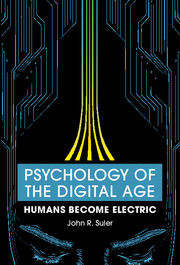Book contents
- Frontmatter
- Dedication
- Contents
- List of Figures
- Foreword
- Preface
- Acknowledgments
- Introduction: Newborns in Evolution
- 1 Cyberpsychology Architecture
- 2 Presence: Be Here Now
- 3 The Dynamic Digital Psyche
- 4 The Disinhibited Self
- 5 Electrified Relationships
- 6 Other Than You Think: Interpersonal Perceptions
- 7 Text Talk
- 8 Image Talk
- 9 I, Avatar
- 10 One of Us: Groups and Communities
- 11 Change and Excess
- 12 Addicted or Devoted
- 13 The Digital Deviant
- 14 Synthesized Realities and Synthesized Beings
- 15 Electric Th erapeutics
- Conclusion: Research and the Researcher
- References
- Index
4 - The Disinhibited Self
Published online by Cambridge University Press: 05 November 2015
- Frontmatter
- Dedication
- Contents
- List of Figures
- Foreword
- Preface
- Acknowledgments
- Introduction: Newborns in Evolution
- 1 Cyberpsychology Architecture
- 2 Presence: Be Here Now
- 3 The Dynamic Digital Psyche
- 4 The Disinhibited Self
- 5 Electrified Relationships
- 6 Other Than You Think: Interpersonal Perceptions
- 7 Text Talk
- 8 Image Talk
- 9 I, Avatar
- 10 One of Us: Groups and Communities
- 11 Change and Excess
- 12 Addicted or Devoted
- 13 The Digital Deviant
- 14 Synthesized Realities and Synthesized Beings
- 15 Electric Th erapeutics
- Conclusion: Research and the Researcher
- References
- Index
Summary
It's what you do in your free time that will set you free – or enslave you.
– Jarod KintzI had spent several years very active in Flickr when one day my wife suggested that I try the new photosharing groups in Google+. I resisted the idea. I didn't particularly want to have to start all over in another social media. Nevertheless, because I was a cyberpsychologist studying online photosharing, and because Google+ was supposedly the Next Big Thing, I reluctantly gave it a try. Without really looking over recent posts in one of the groups that seemed active, I jumped right in to post my own message. I stated who I was, a cyberpsychologist specializing in online photosharing, along with a photo and image pointing to my online book about photographic psychology. The next day I received a message indicating that I had been banned from the community. What? That had never happened to me before. When I contacted the group moderator, he very briefly stated that I had inappropriately, right out of the gate, marketed myself. When I questioned his decision to ban me, he didn't reply. At first annoyed, I then reconsidered the situation. After all, in the real world, I would never pop into a room full of people talking and then announce myself without first finding out what was going on there.
THE ONLINE DISINHIBITION EFFECT
As cyberpsychologists such as Joinson (1998) and myself noted early on, people tend to say and do things in cyberspace that they would not ordinarily say or do in the face-to-face world. They loosen up, feel more uninhibited, and express themselves more openly. We called it the online disinhibition effect (Suler, 2004a). It is an important force that contributes to the acceleration and amplification of social processes in cyberspace, as well as helps explain the privacy paradox, how people express concern about their online privacy even though their behaviors do not reflect those concerns (Barnes, 2006). In this chapter, we will focus on the dimensions of cyberpsychology architecture that influence online disinhibition, particularly the identity, social, text, reality, and sensory dimensions.
- Type
- Chapter
- Information
- Psychology of the Digital AgeHumans Become Electric, pp. 95 - 111Publisher: Cambridge University PressPrint publication year: 2015



